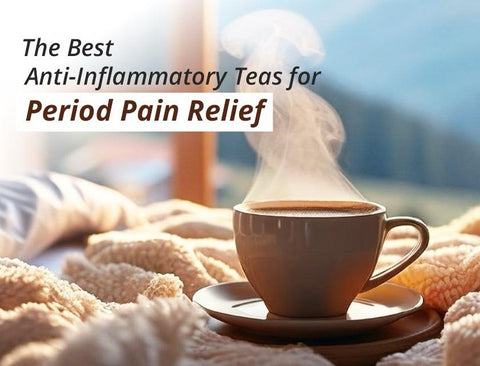Introduction
Let’s be real—period pain can be painful. From dull aches to intense cramps, menstruation often brings discomfort that can disrupt daily life. While hot water bags and painkillers are common go-tos, natural remedies like anti-inflammatory teas are becoming increasingly popular.
Herbal teas not only warm you from the inside but also offer powerful relief by calming inflamed tissues, relaxing muscles, and reducing hormonal discomfort. Curious how? Let’s break it down.
Why Do Period Cramps Hurt So Much? (And How Tea Helps)

Cramps during your period happen because of prostaglandins—hormone-like compounds that trigger uterine contractions to shed the lining. High levels of prostaglandins = stronger contractions = more pain. Ouch.
But nature has a soothing secret.
Many herbal teas contain antioxidant compounds that help :
-
Reduce inflammation
-
Soothe uterine muscles
-
Balance hormones naturally
Best Anti-Inflammatory Teas for Period Pain Relief
Here’s a look at the most effective teas to sip during your period:
Green Tea
Vikram Green Tea helps reduce inflammation and ease menstrual cramps. Its light, refreshing taste calms your body while gently boosting energy during your period.
Sip your way to comfort with a warm cup of wellness from Vikram Tea.

Ginger Tea
A powerful anti-inflammatory, ginger helps block prostaglandins, reducing pain and nausea. It's warm, slightly spicy, and highly effective. It reduces pain and nausea. [ https://www.sciencedirect.com/science/article/pii/S1028455918302304 ].
Peppermint Tea
The menthol in peppermint acts as a mild muscle relaxant—think of it as a cool breeze for your uterus. It soothes the digestive system. A refreshing, cooling option for intense cramp days.
[ https://www.healthline.com/nutrition/tea-for-cramps#4-Peppermint-tea]
Raspberry Leaf Tea
Nicknamed “the woman’s herb,” raspberry
leaf tea tones the uterus and may shorten the duration of cramps over time. It is often recommended for premenstrual support.
[https://www.sciencedirect.com/topics/medicine-and-dentistry/red-raspberry-leaf#:~:text=Red%20raspberry%20leaf%20is%20perhaps,continues%20to%20be%20highly%20popular]
Turmeric Tea [Golden milk]
Turmeric’s active compound, curcumin, is a superstar anti-inflammatory. It helps reduce swelling and supports hormonal balance. Best when paired with a pinch of black pepper for absorption.
[ https://www.goodrx.com/conditions/menstrual-pain/best-teas-for-period-cramps?srsltid=AfmBOorTTZWd3UHnUINFGfXCZajfGfmMDrd_JT3tQAsA0jbiZ1L6wit0 ]
Vikram Kavach – Immunity B
ooster Tea
Vikram Kavach Immunity Booster Tea is inspired by traditional Ayurveda. It is the perfect blend of natural spices and herbs. With the “Power of 7”, the Vikram Kavach Immunity Booster gives you complete “Kavach” with 100% natural spices – Ginger, Cinnamon, Black Pepper, Cardamom, Clove, Ashwagandha, and Tulsi—boost immunity, satisfy your taste buds, and rejuvenate you to do more. Choose Kavach for daily strength and monthly relief.
Chamomile Tea
Chamomile helps relieve cramps by relaxing the muscles in the uterus. It combats the inflammation that causes pain and discomfort during menstruation.
[ https://www.healthline.com/nutrition/tea-for-upset-stomach#TOC_TITLE_HDR_8 ]
How to Use Tea Effectively During Your Period

Maximize your relief with these simple tea tips:
-
Start Early: Begin sipping tea a day or two before your period starts for good relief.
-
Stay Consistent: 2–3 cups per day during your cycle can significantly reduce discomfort.
-
Avoid Excess Sugar: Sweeteners can trigger inflammation. Stick to honey or jaggery in moderation.
-
Keep It Warm: Drinking warm liquids helps boost blood flow and ease cramps faster.
Extra Tips for Period Pain Relief
1. Stay Hydrated
Drink plenty of water to reduce bloating and improve circulation. Herbal teas like Vikram Green Tea count too.
2. Move a Little, Then Relax a Lot
Take a short walk or do some gentle stretching—just 10 minutes of light movement can reduce cramps and uplift your mood.
Then curl up with your favourite blanket, a comforting movie, and a warm cup of Vikram Tea by your side. The perfect self-care combo.
3. Use a Heating Pad
Applying heat to your lower abdomen can soothe muscle contractions and give almost instant relief.
4. Prioritize Sleep
Your body needs extra rest during your period. Aim for 7–9 hours of quality sleep to allow natural healing.
CONCLUSION
While periods may never be completely pain-free, small lifestyle changes, like introducing anti-inflammatory teas, can make a big difference. Natural, comforting, and healing, these teas offer a gentle remedy that your body will thank you for.
Next time cramps hit, skip the painkillers and brew some wellness instead.

FAQ :
Is caffeine bad during periods?
Caffeine can increase anxiety, irritability, and bloating during periods for some people. While moderate caffeine (like a cup of black tea) is usually fine, excessive intake may worsen cramps or mood swings. If you're sensitive, try switching to herbal teas or low-caffeine options during menstruation.
When should I start drinking tea to reduce period pain?
You can start drinking soothing teas a few days before your period begins, especially if you typically experience cramps or PMS. Herbs like ginger, chamomile, or cinnamon can help relax muscles and ease discomfort when consumed regularly during this time.
Which tea is best for really painful menstrual cramps?
Teas known to help with painful cramps include:
-
Ginger Tea – Natural anti-inflammatory and pain reliever
-
Chamomile Tea – Calming, helps reduce muscle spasms
-
Cinnamon Tea – Improves blood flow and reduces inflammation
-
Fennel Tea – May reduce cramping and bloating
Choose caffeine-free, herbal blends for best results.
Is green tea okay during menstruation?
Yes, green tea is generally safe during your period and may even help reduce bloating due to its mild diuretic properties. However, it does contain some caffeine, so limit your intake if you're sensitive or prone to cramps triggered by caffeine.
Will drinking tea help with mood swings too?
Yes, certain teas can help stabilize mood. Chamomile, lavender, and peppermint teas are known for their calming effects. They may ease stress, reduce irritability, and support better sleep, helpful during mood swings caused by hormonal changes.
How long should I steep these teas?
For herbal teas, steeping for 5–7 minutes is ideal to extract full benefits. Stronger herbs like ginger or cinnamon may need 8–10 minutes. Always cover your cup while steeping to preserve the essential oils and aroma.
Can I combine different teas for better results?
Yes, combining herbs like ginger + chamomile, or fennel + cinnamon, can be effective and safe. Just ensure you’re not combining too many strong herbs at once, and avoid excessive amounts. Start with small quantities and observe how your body responds.



